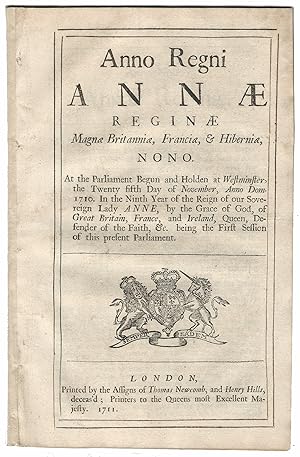A propos de cet article
Folio (10.75 inches). 9 Anne, Chapter 21. General Title leaf + pages 403-442. Woodcut Royal coat of arms and decorative initial. Printed in Black Letter font on laid watermarked paper. Neatly extracted from a bound volume and expertly mended. Closely trimmed along the fore edge with some loss affecting outer letters of marginal text on nine pages. Some light damp staining at the top right corner and along fore edge of most leaves. Otherwise quite clean, and in near very good condition. This Act of Parliament (9 Anne, Chapter 21) announced the terms for incorporation of the South Sea Company (officially The Governor and Company of Merchants of Great Britain Trading to the South Seas and Other Parts of America) as a joint stock company. The terms of incorporation are outlined on pages 432 to 440 of the Act. The South Sea Company had its origin in the idea that the government could sell trading monopolies in return for funds to reduce or eliminate its national debt. The Company was thus granted a monopoly of the British trade with South America and the Pacific Islands (the riches of which were assumed to be unlimited) and profited handsomely by assuming successive portions of the national debt in exchange for South Sea Company shares. The Company appeared prosperous and successful in servicing its responsibility to the national debt, and in 1719 took on the whole of the national debt in return for further concessions, beating off competition from the Bank of England for the privilege and profits. But by 1720, speculation in shares in the Company had got out of hand, and share value soared. Profit-taking quickly reversed the climb in share value, and sellers of stock soon outnumbered buyers. South Sea Company stock value quickly tumbled from £1000 to £175 in a matter of days, dragging a large part of the economy into financial collapse, including the Bank of England. The stock market crash, known as the South Sea Bubble, was blamed on the fraudulent activities of company directors in stock-jobbing and gambling mania. By the years end, thousands of investors had been ruined, and Parliament was investigating the affair. When large scale bribery, fraud, and false accounting were exposed, the estates and assets of Company directors were confiscated. The South Sea Company managed to continue operations (mainly in the African slave trade, for which it maintained its Assiento or contract with Spain to provide Spanish colonies with Negro slaves, in association with the Royal African Company and the Royal Navy) until about 1750, and then sold out its remaining rights to the Spanish government. By 1807, all of its rights had been rescinded, and in 1853 the Company's final annuities were redeemed or converted into government stocks. Sperling 8.
N° de réf. du vendeur 145
Contacter le vendeur
Signaler cet article


